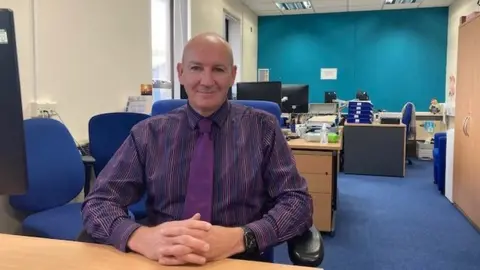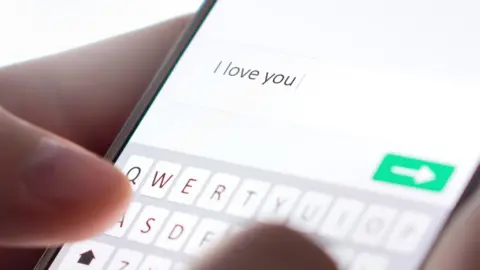Covid: Romance fraudsters 'target lonely' in lockdown
 Getty Images
Getty ImagesA widow scammed out of her life savings by a man she met on a dating app has said it made her feel like she had "lost a loved one" again.
Dyfed-Powys Police said there had been a significant increase in romance fraud during the coronavirus pandemic.
Since January, victims in west Wales have been scammed out of £1.3m by people they met online.
The force said criminals were taking advantage of people's loneliness during lockdown.
Rebecca Jones, fraud safeguarding officer for the force, said men and women aged from 18 to 88-years-old had been targeted after looking for love online.
"Without a doubt, we've seen an increase from the initial lockdown," she said.
"It's a case of people turning to an online relationship during that lonely period and now we're seeing the repercussions of that."
Across the UK between August 2019 and August 2020, Action Fraud received more than 400 reports a month from victims of romance fraud in the UK, with victims scammed out of an average of £10,000 each.
In June, July and August this year, more than 600 reports were made to the hotline a month, indicating an increase in scams during the pandemic.
 Getty Images
Getty ImagesWidow Carole [not her real name] said she met an "attentive, affectionate and funny" man on a dating site, who told her he was widowed, and she fell in love.
"He talked of our future together and all the fun times we would have travelling the world," she said.
But Carole, who lives in west Wales, said he soon asked her for a loan, claiming his bank card had been frozen, but six months after she sent him money she found he was using someone else's photo online and "my world fell apart".
He managed to convince her he was not a fraudster though, and she continued to send him money despite suspicions.
Carole described how she was then used as a "money mule", with him sending money into her account and telling her to forward it to people he owed in Europe.
"I lost a lot of money, but I felt far worse knowing I had been used as a mule to launder money," she said.
"I know that the image I had made in my mind of my love interest didn't match who he was, but it was real to me."
Her bank reported suspected fraud and reported it to the police, and her accounts were frozen, but she lost all her life savings.
"It's my own fault for being so stupid, kind and trusting," she said.
 Dyfed Powys Police
Dyfed Powys PoliceCyber Protection Officer Gareth Jordan said "money mules" often ended up handling a criminal's proceeds without realising it, being told to hold onto money for a while for a favour.
He said while it was a crime, victims should be reassured that police would be looking for the fraudsters rather than blaming them.
"It's incredible how good these criminals are at their social engineering skills - getting the best out of people, working on that person's switches to grab them and drag them into a relationship," he said.
Police said with further lockdowns likely, more people like Carole could fall victim to fraudsters, and they urged people to look for warning signs - like "too perfect" profile pictures, and to stick to reputable apps and websites.
 Getty Images
Getty ImagesCarole said she felt "ashamed, guilty and humiliated, not to mention stupid", and was too ashamed to tell anyone else about what had happened.
Now she has shared her story in the hope it will help others spot the signs and not fall victim to scams.
"My love was real, the feelings I had were real... I felt grief all over again and it brought back all the bad memories of losing my husband," she said.
"I have no self-confidence left and I will find it very difficult to trust or believe anyone again."
